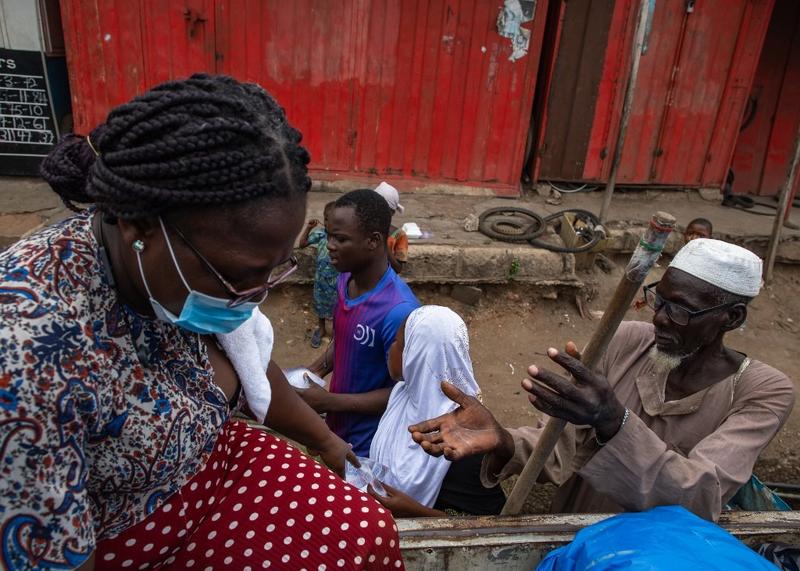 An elderly man receives food from volunteers organizing food parcels at a food distribution organized by the government to help residents to cope with the lockdown at the Agbogbloshie market in Accra, Ghana on April 4th 2020. (NIPAH DENNIS / AFP)
An elderly man receives food from volunteers organizing food parcels at a food distribution organized by the government to help residents to cope with the lockdown at the Agbogbloshie market in Accra, Ghana on April 4th 2020. (NIPAH DENNIS / AFP)
LONDON - Nearly 140 campaign groups and charities urged the International Monetary Fund and World Bank, G20 governments and private creditors on Tuesday to help the world’s poorest countries through the coronavirus crisis by cancelling debt payments.
The IMF is making US$50 billion available from its emergency financing facilities and over 90 countries have already asked for help
The call, spearheaded by the British-based Jubilee Debt Campaign, comes a day before a Group of 20 working group is due to meet, tasked with the coronavirus response for developing countries.
The Jubilee Debt campaign urges the immediate cancellation of 69 poor countries’ debt payments for the rest of the year, including to private creditors, estimating that it would free over US$25 billion for the countries, or US$50 billion if extended through 2021.
ALSO READ: Pandemic impacting young people's mental health
It also called for debt cancellations or additional finance to be free of conditions on economic policy such as austerity, and for the G20 to back emergency rules that would prevent poorer countries from being sued by private creditors.
“Developing countries are being hit by an unprecedented economic shock, and at the same time face an urgent health emergency,” said Sarah-Jayne Clifton, director of Jubilee Debt Campaign.
Major governments and institutions are already pushing for some of the measures the groups are calling for.
The IMF is making US$50 billion available from its emergency financing facilities and over 90 countries have already asked for help. It has also made changes to its Catastrophe Containment and Relief Trust (CCRT) to enable it to offer its poorest members grants for relief on IMF debt service, even if they do not have a major virus outbreak yet.
The World Bank has also approved a US$14 billion emergency COVID-19 response package, and says it stands ready to provide US$160 billion in aid over the next 15 months.
The institutions are also pushing jointly for official bilateral creditors to allow low-income countries to suspend their debt-service payments for 14 months from the start of May.
‘An apocalyptic moment’
But Tuesday’s message from the charities and campaign groups echoed the recent concerns of African governments - that it won’t be enough. Ethiopia said in a proposal submitted ahead of the G20 meeting that Africa alone is likely to need US$150 billion of support.
“Out of the 69 low-income countries we are talking about, at least 45 of those are going to need to request emergency funding just to get through 2020,” said Mark Perera, a policy manager for the European Network on Debt and Development, one of the groups involved.
READ MORE: Poorer nations are least prepared for pandemic lockdowns
Debt relief has been provided before to the help the world’s poorest countries, but the dynamics have changed considerably.
When the IMF and World Bank launched their Heavily Indebted Poor Countries (HIPC) debt relief program in 1996, nations mainly owed money to wealthy countries and multilateral institutions.


